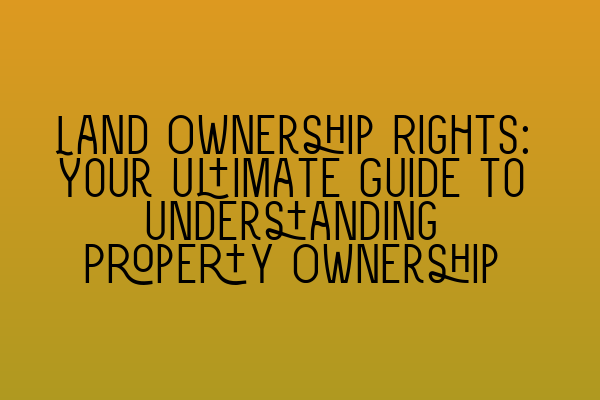Land Ownership Rights: Your Ultimate Guide to Understanding Property Ownership
Are you thinking of buying a property? Or perhaps you already own one and want to ensure you understand your land ownership rights? Whatever the case may be, it’s crucial to have a comprehensive understanding of property ownership in order to protect your rights and make informed decisions. In this ultimate guide, we will provide you with all the essential information you need to know about land ownership rights in the UK. So, let’s dive in!
Types of Property Ownership
In the UK, there are two main types of property ownership: freehold and leasehold. Freehold ownership grants you full ownership rights and title over both the land and the property on it. On the other hand, leasehold ownership gives you the right to occupy the property for a specified period, usually long-term, but the land remains owned by the freeholder. If you own a leasehold property, it’s crucial to understand and adhere to the terms and conditions of the lease agreement.
To gain a deeper understanding of leasehold ownership and the legal challenges associated with it, check out our comprehensive guide on Navigating Lease Laws in the UK: Essential Guidelines for Tenants and Landlords.
Property Registration and Title Deeds
Property ownership is registered with the Land Registry in the UK. When you purchase a property, a registered title is created in your name, and you receive a Title Deed as proof of ownership. The Title Deed contains crucial information such as property boundaries, rights of way, and any restrictions or charges affecting the property. It’s vital to carefully review the Title Deed to ensure you understand all the rights and obligations associated with your property.
Understanding Easements and Covenants
Easements and covenants are important considerations when it comes to land ownership. An easement is a right that someone has over another person’s land, such as a right of way or a right to access services. A covenant, on the other hand, is a legal agreement between property owners that outlines certain obligations or restrictions. It’s crucial to understand any easements or covenants that may affect your property, as they can have significant implications on your rights and responsibilities as an owner.
For a comprehensive guide on legal challenges in property transactions, including easements and covenants, check out our article on Legal Challenges in Property Transactions: A Comprehensive Guide.
Boundary Disputes
Boundary disputes can arise when there is a disagreement between property owners about the exact location of property boundaries. These disputes can be complex and often require legal intervention to resolve. If you find yourself in a boundary dispute, it’s crucial to consult with a legal professional who specializes in property law to protect your interests and ensure a fair resolution.
Updates in UK Property Laws
Property laws are continually evolving, with new legislation and regulations being introduced regularly. Staying updated on these changes is essential to ensure you are aware of your rights and obligations as a property owner. Check out our article on Updates in UK Property Laws: Key Changes and Implications to stay informed about the latest developments in property law.
Seeking Professional Advice
While this guide provides you with essential information about land ownership rights, it’s important to note that property law can be complex. If you have any concerns or questions regarding your property ownership, it’s always best to seek professional legal advice. A solicitor with expertise in property law can guide you through the intricacies of property ownership and ensure you fully understand your rights and responsibilities.
Conclusion
Understanding your land ownership rights is of utmost importance to protect your investment and make informed decisions about your property. By familiarizing yourself with the types of property ownership, property registration, easements, covenants, and potential boundary disputes, you can navigate the complexities of property law with confidence. Remember to stay updated on any changes in property laws and consult a legal expert when needed.
For more in-depth knowledge on property law and to avoid common pitfalls, explore our article on Dominate Property Law Questions: Avoiding Common Pitfalls. And if you’re looking for effective revision tips for your land law exams, don’t miss our article on Land Law Revision Tips: Ace Your Exam Preparation.
